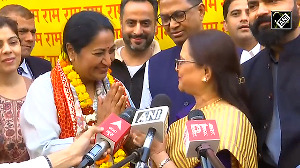The proposal by the Telecom Regulatory Authority of India to cap charges for channels shown on direct-to-home platforms at Rs 5 per month is in line with what has been allowed for those operating conditional access service networks.
Since both are addressing the same consumer, the proposal has inter se equity as a plus point. And the business of capping the CAS/DTH bill to the TV-watching home has a certain populist appeal. The problem is that the basic proposal on CAS was unfair to channel owners and removed the incentive for channels to produce superior/differentiated programming that might cost more money and/or which commands greater audience pull.
Extending this faulty logic to DTH now will compound the offence. Star TV, for instance, paid very large sums of money to, first, Amitabh Bachchan and later, Shah Rukh Khan, to host Kaun Banega Crore(Rs 10 million)pati. But
if it cannot charge more than a rival channel which does not have such expensive programming, how is it to meet its higher costs?
The same holds for sports broadcasters who bid hundreds of crore (Rs 10 million) for exclusive cricket broadcasting rights. One answer is that channels with superior programmes and, therefore, a larger audience will get their payback through higher advertising revenue. That is true, of course, but why should the channels be denied the right to ask more from the viewer as well?
There is also the position in which niche channels find themselves; they cannot charge the premium advertising tariffs that the mass market channels get away with, and therefore are more dependent on revenue from the viewer.
Channels like Discovery and National Geographic, movie channels that offer viewers no ad breaks in the middle of a film, and news channels in regional languages function in markets that are not ad-rich. Why should their viability be denied to them by executive fiat?
Quite apart from this, the Rs 5-per channel proposal assumes that viewers want to watch a chosen channel every month of the year -- but for sports channels, particularly, viewership patterns can and do vary from month to month, depending on the sporting calendar. Imposing a price cap for channels like Neo Sports could well be forcing them into bankruptcy.
As it happens, most viewers were quite happy to get their television service through small, mostly local cable firms in the pre-CAS/DTH era; the group that got hurt here in that system was the broadcasters, who complained that the cable companies were under-reporting viewership numbers and thereby cheating the channels of revenue.
The merit of CAS/DTH was that broadcasters would be able to know their true audience and therefore get their genuine due. This gets knocked out if the regulator imposes a cap on channel pricing.
As against all this, the one argument in favour of a cap is that consumers don't have much of a choice once they go in for CAS/DTH, since the number of service providers is limited. The comparison is invariably made with telecom, where companies are now allowed to charge what they want, whereas in the initial years the telecom regulator had imposed a cap on mobile phone tariffs.
It was only when there was enough competition that the regulator decided to move to 'forbearance' and companies became free to charge what they felt the market could take. Perhaps the solution till there is enough competition in the CAS/DTH space is to have differential caps for different kinds of channels, because one size simply does not fit all. The other issue that the regulator needs to look at relates to the regulation of carriage fees.
Today, broadcasters who cannot charge CAS/DTH firms more than a flat amount are increasingly held to ransom by CAS/DTH firms in terms of carriage fees.
Again, a comparison with telecom is useful -- while regulating tariffs at the consumer end (before 'forbearance' was allowed), the regulator also regulated every tariff in between, like that charged by Airtel each time a Hutch/Vodafone subscriber called on its network.







 © 2025
© 2025